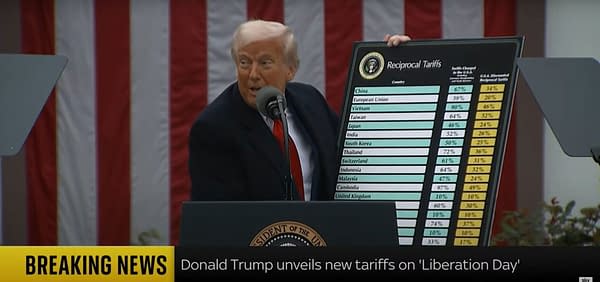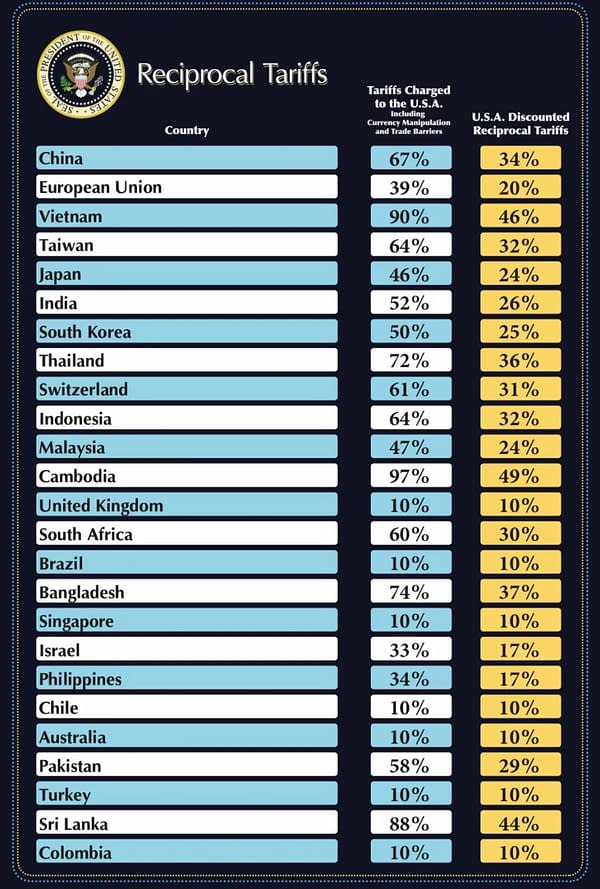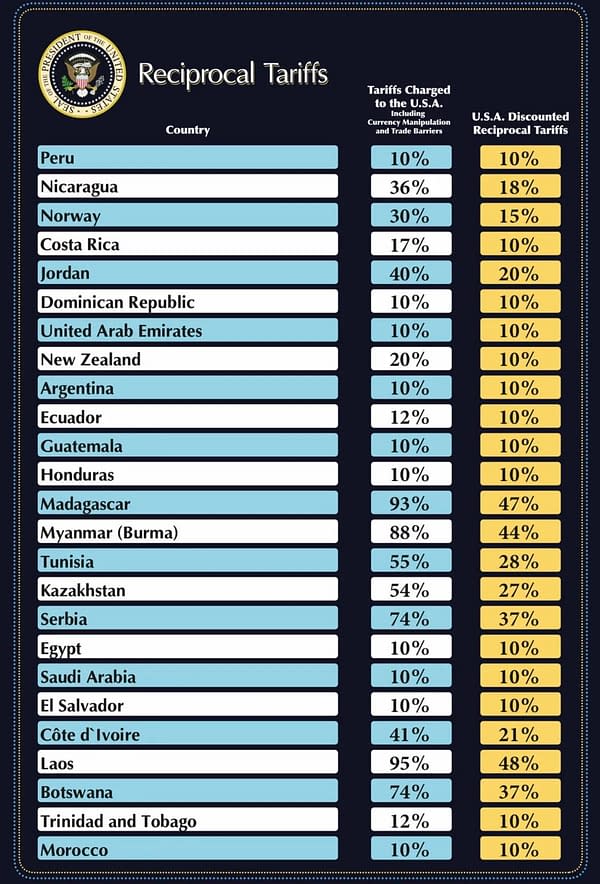Posted in: Comics, Current News | Tagged: donald trump, tariffs
Latest Trump Tariffs About To Hit The Comic Book Industry Explained
Explaining the latest Trump Tariffs about to hit the comic book industry and what's behind the fictitious numbers used to justify them?
Article Summary
- Trump's new tariffs increase comic book import costs, impacting publishers and retailers.
- China comics face 54% tariff, devastating razor-thin profit margins for creators.
- Fictitious foreign tariffs debunked, revealing U.S. retaliation rather than reciprocity.
- Tariffs strain an already challenged comic book industry, disrupting global trade.
Yesterday, President Donald Trump announced a range of new tariffs across the world. Labelled "reciprocal tariffs", they were anything but. A list of claimed fictitious tariffs was placed against the US, and Trump listed his own tariffs back, generally around half of the fictitious ones. And comic book publishers look to be hit hard.
As it stands, American comics publishers seem to have avoided the threatened tariffs on comics being printed by Canadian publishers. But they have already been dealing with 20% tariffs on comics published in China, often the larger, high-end collections such as omnibuses, but also many, many trade paperbacks, graphic novels and the like. The promised 34% tariff is in addition to the previous 20%, making a 54% tariff on all manner of comic book collections, including those that have been printed and are on the way. David Campiti of Glass House Graphics posted, "Trump just announced a 34% tariff on goods from China, torpedoing my already-completed Kickstarters' razor-thin profit margins. My already-funded Kickstarters, awaiting printed books to be shipped out to me next week, will now collectively lose a small fortune. It might actually be cheaper to pay off the printer, trash the books, and refund every Kickstarter buyer. My classic comic book spinner rack shipments will be impacted just as badly. My mind boggles at how much financial damage this will cause." Additionally, figurines and merchandise will also be hit with this. Regan Clem of Summit Comics in Lansing, Michigan, posted simply, "Funkos. 46% tariff."
The UK products were hit with a 10% tariff on everything, which includes the likes of 2000AD, Judge Dredd Magazine, Conan The Barbarian, Blade Runner, Doctor Who Magazine, Phoenix Comics Weekly, and other popular titles from the likes of Rebellion, Titan Comics, Panini UK, DFC and the like… unless they print in Canada and can ship direct.

As for the nature of the tariffs, I knew they were wrong from the start. The UK does not have 10% tariffs against the US, and the European Union does not have 39%. They are fairly close, around 3% taken on average across a number of industries. So where did these fictitious numbers that Trump could rail against come from? Here's the answer. They took the trade deficit between the US and the country, on goods alone, not services, and divided it by the goods exports from the US to that country. James Surowiecki, editor of the Yale Review, stated, "We have a $17.9 billion trade deficit with Indonesia. Its exports to us are $28 billion. $179/$28 = 64%, which Trump claims is the tariff rate Indonesia charges us. What extraordinary nonsense this is." It is worth noticing that the US runs a massive trade surplus in services into the world.
Throw in any territory that has no trade deficit, or indeed has a trade surplus with the USA, such as the UK, it is getting an across-the-board 10% tariff. Add this, and suddenly, all the figures make more sense, expose exactly what's going on here, and explain why the penguins are also being hit by 10%.
The thing is, there is an argument to be made, and you could make it, about targeting countries that have a goods deficit with the USA in order to bolster the US manufacturing base and services be damned. But then why not say that's what this is? Why lie and say that it is other countries' tariffs that you are targeting rather than another economy doing one thing better than you, and tariffs are being used to balance that deficit? Either there is a belief that the American people won't understand, or more worryingly, that the person presenting the policy doesn't understand.
Because these are not reciprocal tariffs. They are revenge tariffs against the free market… but only one part of it. Now, tariffs and other taxes can play an important part in any economy and can be very useful for dealing with market irregularities and unforeseen outcomes and trying to nudge people in one direction or another. However, blanket tariffs like this have a tendency to create some very strange outcomes. And for a comic book industry that is facing many challenges right now, the outcomes don't look like they will be good ones.
- US Tariffs
- US Tariffs

















